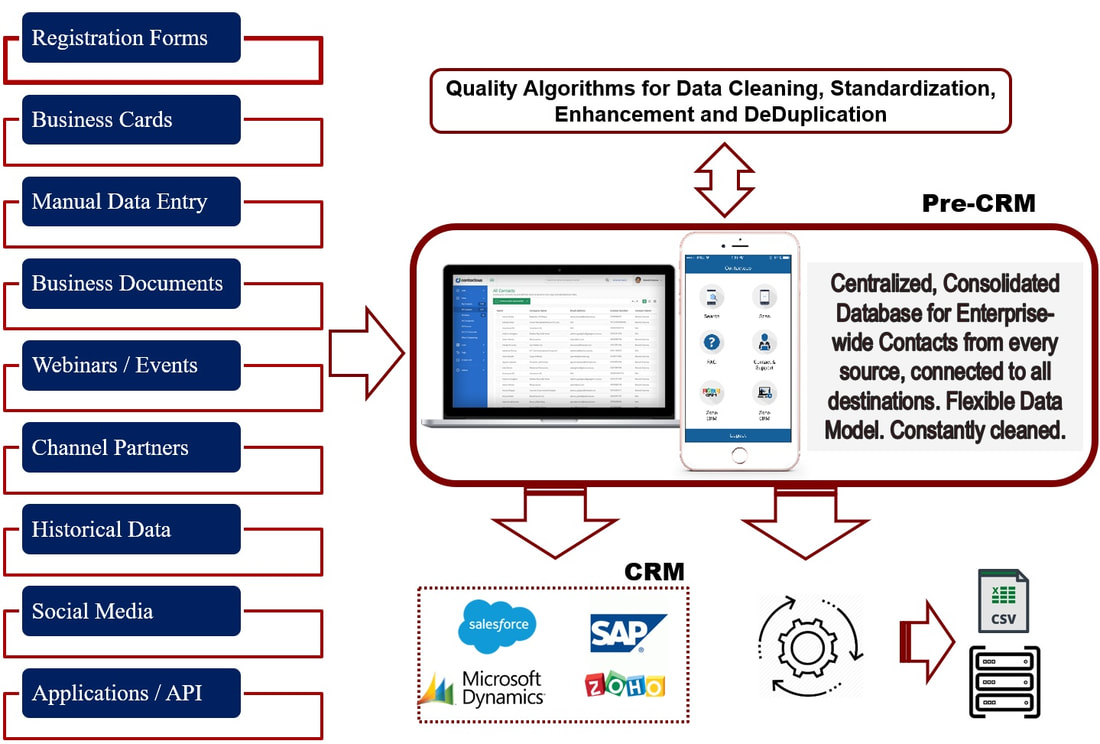- The CRM of an insurance company in a small Asian country is of 1.2M records, comprising of individual names. The Pre-CRM marketing database with consolidated leads is over 12M. Data from every incoming source is designed to enter the Pre-CRM first, before being acted on.
|
CRM is not meant for Data Dump. Pre-CRM is.
Much has been written on the cost of duplicate or corrupted data. While the problems resulting from bad CRM data are clear, fresh sets of issues start to arise when CRM is used as a dumping ground for all incoming data in the organization. The signals coming from CRM are usually misinterpreted by leadership and there are case studies to back it up.
In our consulting engagement, we came across a CRM with 1.6M records, while their active customers were less than 4,000, and records in active pipeline was a reasonable number. This company's marketing had chosen to use their CRM as a database to dump every purchased list of contact, every output of business card scanner, tradeshow and webinar attendees and every name who downloaded the white paper from their site. The problems resulting from such a decision were clear as they spent a great deal of time in giving explanations on the CRM output. While this case was extreme, but variations of this scenario are common. Licensing cost aside (which this organization was paying was massive!), the cost of maintaining such amount of data in a system which is meant to have trustworthy, clean records is very high.
Pre-CRM is the answer. It is a centralized repository which contains every data record that enters an organization, with powerful cleaning and deduplication tools constantly acting on it. Capable of ingesting records of any format and in tens of millions, this Pre-CRM gets connected through APIs to external data sources and CRMs.
In our consulting engagement, we came across a CRM with 1.6M records, while their active customers were less than 4,000, and records in active pipeline was a reasonable number. This company's marketing had chosen to use their CRM as a database to dump every purchased list of contact, every output of business card scanner, tradeshow and webinar attendees and every name who downloaded the white paper from their site. The problems resulting from such a decision were clear as they spent a great deal of time in giving explanations on the CRM output. While this case was extreme, but variations of this scenario are common. Licensing cost aside (which this organization was paying was massive!), the cost of maintaining such amount of data in a system which is meant to have trustworthy, clean records is very high.
Pre-CRM is the answer. It is a centralized repository which contains every data record that enters an organization, with powerful cleaning and deduplication tools constantly acting on it. Capable of ingesting records of any format and in tens of millions, this Pre-CRM gets connected through APIs to external data sources and CRMs.
The idea is actually simple and a few minutes thinking on this topic will start to make logical sense. Consolidate all the contacts within an organization into a Pre-CRM. Usually owned by Marketing, this tool has connectors to ingest and import data from multiple systems. Consolidating marketing leads is a strong use case from our experience, esp as all the historical data of every lead gets into a single system. As the data from all sources gets consolidated, it helps in generating relationship intelligence reports to answer the question on 'Who Knows Who?' within the organization.
Three Routes to Centralized Marketing Database
Organizations have built large consolidated databases using Contactous' products. There are 3 approaches -
- If one needs to perform major analysis on database, segment it with tags and list, run power queries, connect with APIs and give access to the data to thousands of users including external partners, then Enterprise Contact Manager is the answer.
- If the focus is to clean the incoming data, analyze similarity (de-duplication) from dozens of dimensions including powerful functions like chaining duplicates, perform real-time de-duplication and entity resolution then CRM Data Quality is the right solution.
- If the database is in tens of millions of records and due to security, legal, compliance reasons it cannot leave the organization boundaries then the on-premise based DataQual is the correct approach.


